Research
Call for Applications: PhD Research Grants
Published
3 years agoon
By
Mak Editor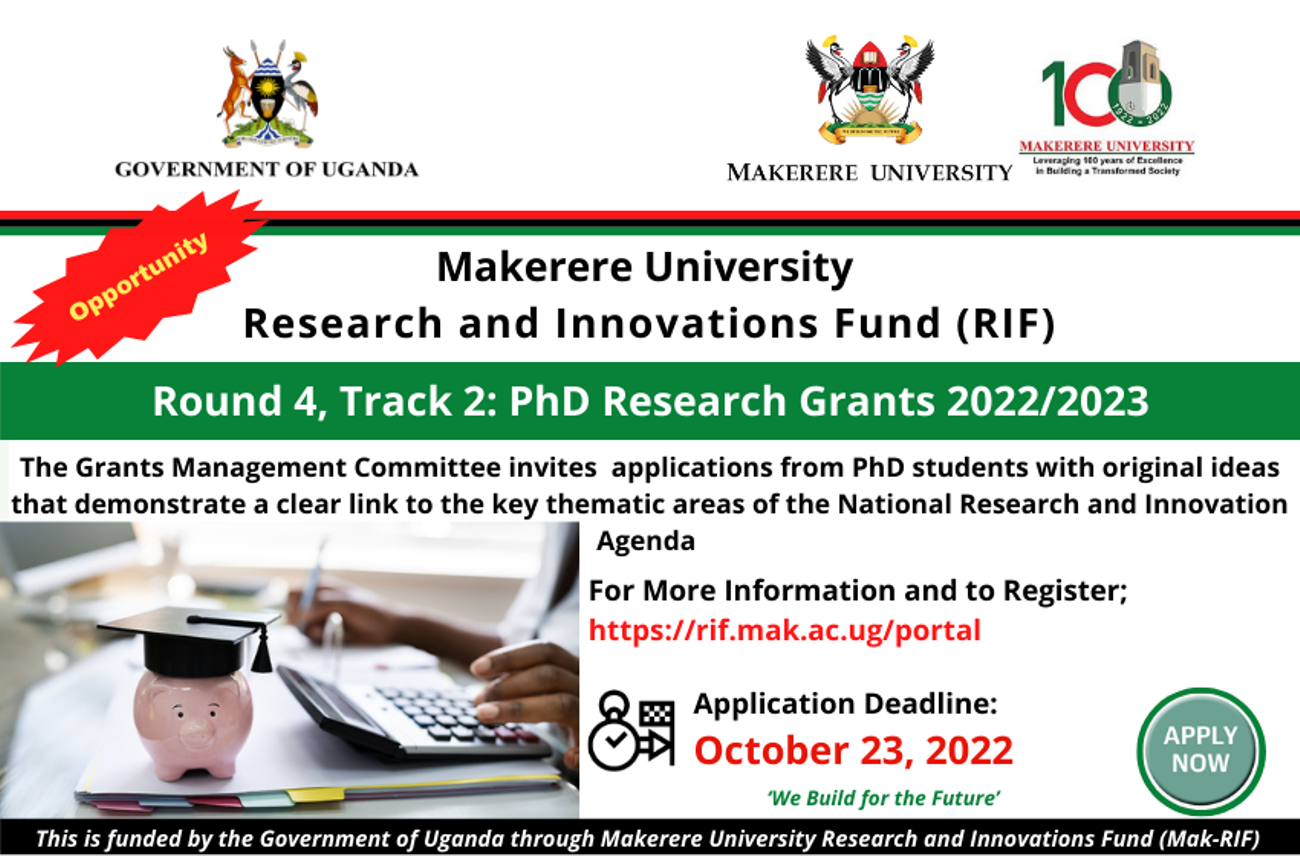
BACKGROUND
Funding opportunity description: Makerere University received special funding from the Government of the Republic of Uganda, to support high impact Research and Innovations that will accelerate national development. The Financial Year 2022/23 will be the fourth year of this fund’s availability. The fund illustrates the increasing importance that the Government attaches to Research and Innovation as a driver of socio-economic transformation. The objective of the fund is to increase the local generation of translatable research and scalable innovations that address key gaps required to drive Uganda’s development agenda. Over the last three Financial Years (2019/2020, 2020/21 and 2021/2022), government appropriated 79 Billion Uganda Shillings to support this Fund. Between the two years, MakRIF has funded a total of 775 projects across all sectors critical for development. In the next Financial Year (2022/23), Makerere University expects to receive about 30 Billion Uganda shillings (about US$ 8.1 million) under the Government Research and Innovation Fund (RIF). Of this, at least 3 Billion Shillings will fund PhD research ideas that generate knowledge that addresses national development priorities. The Makerere University Research and Innovation Grants Management Committee (GMC) therefore announces the RIF Round 4, Track 2 (PhD Research Grants). Available funds are obligated for the Financial Year 2022/2023, with an expectation of actionable results that speak to the National Research and Innovation Agenda. The GMC therefore invites applications from PhD students with original research ideas that demonstrate a clear link to key thematic areas of the National Research and Innovation Agenda.
This is a closed call that is open to only PhD students. This funding call is specifically targeted to PhD students that are full time at Makerere University.
Grant amounts and estimated number of awards: The GMC estimates to award the following number and amount of PhD Research Grants:
| Category | Amount per award | Approximate Number | Total amount |
| Category 1: Arts and Humanities | Up to 25,000,000/= | 50* | 1,250,000,000/= |
| Category 2: Sciences | Up to 35,000,000/= | 50* | 1,750,000,000/= |
| Total | 100 | 3,000,000,000/= |
*Note: The numbers shown are only indicative. The MakRIF GMC reserves the right to adjust the numbers based on the quality of the proposals submitted.
Applicants should take into consideration the following:
- Given that the MakRIF funds are received on an annual basis, and are tied to a specific financial year, the current grant only commits to funding the awardee for a period of one year. This award therefore covers one financial year.
- However, the MakRIF GMC is cognizant of the fact that PhD research often spreads over more than one year in which case it requires multi-year funding. Because of this reality, PhD students who are funded under this round will be eligible for extension funding in the following financial year. Second year funding will not be automatic but will be conditional to the following: 1) Availability of funds, 2) Showing cause as to which additional areas of research will be covered in the second year of funding, 3) Successful execution and completion of all the objectives for Year 1 funding, evidenced by full submission of the required deliverables; 4) Full technical and financial accountability for all the funds given to the researcher during the current year of funding. Students would have to apply for the follow-on funding through the next year’s PhD Research Grant call.
- The GMC recognizes that the amounts indicated for this award may not be sufficient to cover all the necessary costs for a student’s project. In such cases, the award should be considered as a contribution and the students should mobilize additional funding to bridge the resource gaps.
- The number of awards indicated are only estimated and the GMC retains the discretion to determine the amount and number of awards based on the actual funding that MakRIF funders will make available and the number of quality proposals submitted.
Scope and Technical Description of the Research and Innovation Grant
The GMC conducted a comprehensive stakeholder consultation to identify priority thematic areas of interest for national development. The GMC triangulated this information with that from the National Development Plan III, the Makerere University Strategic Plan and Research Agenda to develop an instructive MakRIF research agenda that responds to national development priorities. The RIF Round 4, Track 2 (PhD Research Grants) will therefore specifically target research and innovation projects that align with priority thematic issues in the MakRIF instructive Research Agenda under 14 thematic areas as follows:
Theme 1: Transforming the Agricultural sector to drive development
Theme 2: Achieving Sustainable health as a means to sustainable development
Theme 3: Re-imagining Education to unlock capacity for economic development
Theme 4: Water, sanitation and the environment: A pre-requisite to sustainable development
Theme 5: Harnessing the social sector, culture and arts to drive development
Theme 6. Harnessing Tourism, wildlife and heritage for development
Theme 7: Sustainable Planning, finance and monitoring as catalysts for growth
Theme 8: Leveraging public service and local administration for efficient service delivery
Theme 9: Defence and security: Achieving sustainable peace and stability
Theme 10: Strengthening law, governance, human rights and international cooperation as prerequisites for development
Theme 11: Harnessing Information and Communication Technology to drive development
Theme 12: Works, manufacturing, science and technology as tools to accelerate development
Theme 13: Solutions to catalyse business and enterprise
Theme 14: Energy and Minerals as drivers of rapid economic development
Click here to view details of each theme.
The Mak-RIF PhD Research Grants will cover all technical disciplines in Makerere University as long as the research questions align with the instructive research agenda themes above. Particular attention will be paid to ideas that have clear potential for scalability to drive development.
Note: This grant covers the coasts of research. It does not cover payment of tuition or living stipends for the PhD students.
Eligibility
The PhD research grants will only be open to PhD students who have been approved for full registration at Makerere University. Students who have already received full scholarships under other award programs are not eligible to apply for these grants as this will constitute double funding. In line with this, PhD students who are members of academic faculty of Makerere University are not eligible since they are covered by the Staff Development Program. This funding is only open to Makerere University students. PhD students registered in other universities are not eligible for this funding. Further specifications on the awards are as follows:
- Applicants must be at a stage where they have been approved for full registration as PhD students at Makerere University. Being at the stage of full registration means that they have developed a full research proposal that has been approved by the respective Higher Degrees Research Committee in their academic unit, and that they have been have been recommended for full registration OR are fully registered by Makerere University. Applicants will be required to provide evidence of one of the following: Minutes of the Higher Degrees Research Committee in their Academic college, showing approval of their research proposal, OR a full registration certificate.
- Because the research funds are provided for one year funding cycles, PhD students with provisional registration will not be eligible for funding under this award since the time required for them to complete full proposal development and to start data collection is unlikely to fit within the financial year.
- These grants are limited to PhD students who do not have prior funding for their studies or whose funding is inadequate to cover their research. Applicants in the latter category must make full disclosure of their other funding sources and what they cover.
- Applicants should provide a letter of support from any one of the following: 1) The Head of their Department, or 2) The Dean of their School, or 3) the Principal of their College (Only one of these is sufficient).
- Applicants should provide a letter of support from one of their Supervisors within Makerere University. The letter should clearly indicate that they do not have other funding that fully covers their research/training activities, or where such funding is available, they should indicate what aspects of the student’s study program it covers and the funding gap. The supporting Supervisor will be designated as a co-Investigator on the research project.
GRANT GUIDELINES
MakRIF PhD Research Grant applicants will submit a competitive project proposal for the available funding. The proposal ought to specify the objectives for the full research project. It should also indicate which of the full research objectives will be specifically met by the available funding for this financial year.
Students intending to apply for multi-year funding in the subsequent years will be required to indicate so. In such cases, the students should indicate which study objectives would be covered by the extension funding.
The research problem: The proposal should clearly articulate the knowledge gap that the researcher targets to address, and why it is important to address this knowledge gap. The research problem should be aligned to at least one theme in the MakRIF research agenda.
The proposed solution: PhD Researchers should present the proposed solution in form of the research focus for the current phase of the funding. They should clearly articulate the objectives of the planned research. Researchers should also describe the critical content of the solution (i.e., the ‘research methodology’). Researchers should defend the relevance of the proposed solution to addressing key development outcomes in the respective sector and its alignment to one or more thematic areas specified in this call. Researchers should also demonstrate that at least one objective of their research project is implementable within one (1) year and will result in tangible results within one year of execution.
Research projects that require multi-year implementation will only be considered if they can show actionable intermediate results or objectives attainable within 1 implementation year, since funding will be on a yearly basis. Apart from a summary of the proposed approach, researchers will provide a more detailed description of their technical approach (research methodology) to enable a robust assessment of the rigor of the proposed methodology.
Outputs, outcomes and impact: Researchers should articulate the overall scientific outputs, outcomes and anticipated impact of the PhD research project. They should state the primary (Direct) and secondary (Indirect) beneficiaries of the planned research project. They should state the anticipated outputs (the outputs of the activities of the entire project as well as the specific milestones to be attained with the one-year funding) and the outcomes (both the outcomes of the entire project and those for the current funding phase). Researchers should also state the anticipated impact of the the project (Note: Impact might not be achievable in one or even a few years in which case the current phase only contributes to it). Since this funding is specific to the current financial year, projects must demonstrate clearly the deliverables they expect within one year, matching the level of investment made and attainable in the 1-year timeframe. Multi-year projects should show clearly what will be achieved in the current year of funding as well as what would be achieved overall when the full PhD research is completed in the subsequent years.
Translation and dissemination for impact: Since this fund is aimed at supporting government and its partners to improve service delivery and to accelerate development, researchers should show a clear plan for disseminating their findings to audiences critical for policy and program change so as to achieve impact at scale. This will include a clear description of the knowledge translation and dissemination plan to stakeholders in the relevant sectors including the knowledge products anticipated to arise from the study (e.g., publications, policy briefs, knowledge briefs, etc.). Innovation-based projects should articulate a scaling strategy, including linkage to scaling partners within the industry (for commercially viable enterprises), or within the relevant public sectors (for innovations targeted to the public) or within relevant implementing agencies (for social enterprises). Innovations targeting commercial interest should demonstrate the anticipated commercial potential, anticipated demand, anticipated patents/copy-rights/industrial design claims/trademarks if applicable and the path to commercialization. Innovations targeting social impact (social innovations) should elucidate the path to wide scale community uptake.
Ethical implications: The implications of the research to human subjects, animal subjects and the environment should be articulated where necessary including how key ethical or environmental concerns arising from the study will be addressed. It is anticipated that at the time of full registration, projects requiring ethical approval will have already obtained that approval from their respective ethics committees.
Budget: Researchers will prepare a summary budget for the one-year phase of their project as well as a detailed budget. Budgets should be submitted in the official currency (Uganda Shillings). Because these are university funds, academic units (Departments, Schools and Colleges) will not charge institutional overheads to any of the research funds. Budgets should not spread beyond one Financial Year. Even if the projects to be funded under this mechanism are multi-year, researchers should provide a budget for only one Financial Year. The budgets will include the following sections:
- 1.0 Personnel costs
- 2.0 Travel
- 3.0 Supplies and services
- 4.0 Equipment
- 5.0 Program activity costs
- 6.0 Dissemination
Under Personnel costs, applicants should not budget for ‘Salaries’ for staff who are paid a salary by Makerere University or another Government of Uganda institution (whether on permanent or contract terms) as this would constitute double payment from government funds. However, such researchers can budget for ‘activity-based’ time input or ‘level-of-effort-based’ costs for their additional time input into the project in form of allowances. The latter should be justified by specifying the extra-time demands from the project for each individual involved.
Researchers can budget for salaries for critical project staff that are not paid by Makerere or the Government of Uganda e.g., Project Coordinators, Administrative Assistants, Research Officers etc. Regular Personnel costs excluding field research assistants should not exceed 33% of the budget. Field research assistants (or Data collectors) if needed should not be included under ‘Personnel costs’ but should instead be included under ‘Program Activity Costs’. All salaries and all repetitive allowances will be subject to mandatory statutory deductions at source, to pay the relevant taxes. Because these funds are earmarked to support actual research, PhD students cannot budget for a monthly stipend under this award.
In addition to the summary budget, research teams will be required to attach a detailed budget (As an MS Excel attachment) that breaks down all expenditure line items, inclusive of a budget justification that explains the rationale behind the different budget items. The total budget in the budget summary should exactly match that in the detailed breakdown. You should budget within the category that your project was funded in RIF-1. Budgeting in another category will lead to disqualification. The total budget should not exceed the highest amount indicated for the respective funding category in which your project lies. Exceeding the indicated category maximum can result in disqualification.
PhD Researchers can also budget for Tuition.
Workplan: Researchers will provide a list of key milestones for the project clearly demonstrating the deliverables expected at each point during the extension phase of the project. These milestones will be used as the basis for tracking implementation of activities towards project goals and outputs. Given the one-year time-frame for the awards, it will be important that researchers commit to a clear time-bound set of deliverables all achievable within one year for the main deliverable targeted during the current period of funding. Failure to articulate a one (1) year plan will imply inability to utilize the grant funds within one (1) year
GRANT PROCESS
Submission of applications: Submission of the applications will be online at http://rif.mak.ac.ug/portal All submissions must be online and must be made within the stipulated period. To access the application form, the PhD Research Fund applicant will be required to create a MakRIF account. In your account, select the appropriate funding opportunity and fill out the application form.
Rules governing applications: All applications should be written in English. All applications should be submitted via the online portal mentioned above. Complete applications must be submitted not later than 11.59pm East African Time on the closing date. No submissions after closure of applications will be accepted. Any attempt at solicitation of acceptance beyond this date will not be entertained. The Grants Committee bears no responsibility for submissions that are not completed in time and incomplete submissions will not be considered. If none of the submitted applications meets the requirements to receive a grant, the call may be reopened at the sole discretion of the Grants Management Committee. An individual researcher should not submit more than ONE application.
Participants agree to assume any and all risks, and to waive claims against Makerere University and the Grants Management Committee for any injury, death, damage, or loss of property, revenue, or profits, whether direct, indirect, or consequential, arising from their participation in this grant implementation.
Evaluation and selection of projects: Applications will be reviewed by the GMC. Submission of an application does not mean the project must be funded. The GMC will evaluate five main aspects of the project:
- The alignment of the proposed research to national priorities as stipulated in the MakRIF research agenda
- Clear articulation of the knowledge gap and how the planned research will contribute to building new knowledge
- Quality of the proposal in terms of the relevance and innovativeness of the proposed solution, the planned activities and the articulation of a sound methodology
- Clear stipulation of outputs and outcomes and feasibility of tangible achievements within one year of funding
- Potential impact and transformativeness of the proposed research idea
- Submission of a realistic budget
Notification of successful applicants: Successful applicants will be informed by email to their designated point of contact.
Grant timeline:
| Milestone | Date |
| Issuance of RFA | Thur 29th Sept 2022 (Closed to PhD students only) |
| Closing date for applications | Sunday 23rd Oct 2022 |
| Selection | Monday 24th October 2022 to Friday 18th November 2022 |
| Award notification | Friday 18th November 2022 |
| Induction | Tuesday 22nd November 2022 |
To submit application, please create an account on https://rif.mak.ac.ug/portal and login to start the application process.
You may like
-
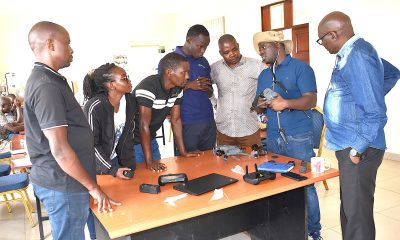

NbS4Tea Project Team Makes Great Progress, Deploys Drones for Data Collection
-
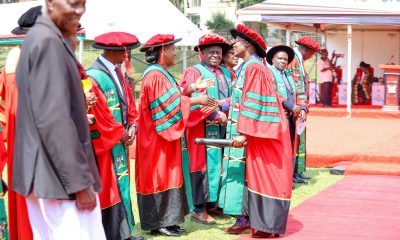

Scholarship Opportunity: Impact of Food Supplementation
-
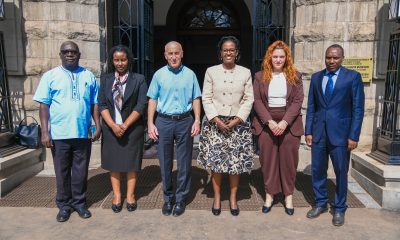

Israeli Ambassador Lotem Talks Innovation on Farewell Visit
-
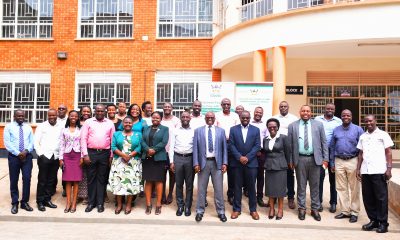

GAMSU Training Workshop Urges CoBAMS academic staff to embrace grant writing
-
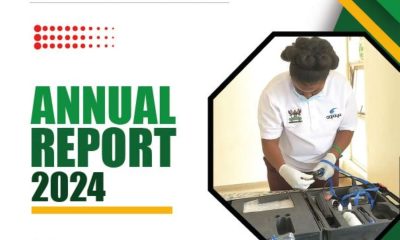

CAES Annual Report 2024
-
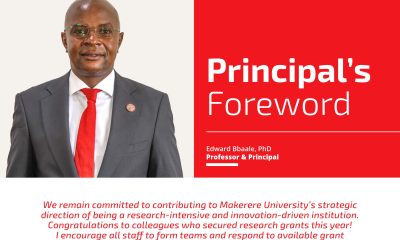

CoBAMS Annual Report 2024
Agriculture & Environment
NbS4Tea Project Team Makes Great Progress, Deploys Drones for Data Collection
Published
1 week agoon
June 24, 2025
****Funded by the Danish Fellowship Centre under Denmark’s Ministry of Foreign Affairs, NbS4Tea is a five-year initiative aimed at enhancing climate resilience and tea productivity in Uganda.
Launch of drones for data collection
The Nature-based Solutions for Tea (NbS4Tea) project has registered a significant milestone with the successful deployment of drones to improve environmental and agricultural data collection.
On 19th June 2025, the project team officially launched the drones at the Rwebitaba Tea Research Centre in Kyenjojo District, the project’s main research hub. The launch event included hands-on training sessions by Mr. Timothy Mutungi, a certified Remote Sensing Drone Pilot. Mr. Mutungi provided detailed instruction on drone operation, safety procedures, and data acquisition techniques specifically tailored to the project’s goals. The training was attended the core NbS4Tea researchers as well as students supported by the project.

By utilizing drone technology, the team will be able to capture high-resolution imagery and gather critical environmental data across vast tea-growing areas. This will enable more precise assessments of biodiversity, soil health, water use, and overall ecosystem services. The valuable insights generated will guide the development of sustainable, nature-based agricultural practices with the potential for widespread adoption throughout the tea industry.
About the NbS4Tea Project
NbS4Tea is a five-year initiative aimed at enhancing climate resilience and tea productivity in Uganda. Funded by the Danish Fellowship Centre under Denmark’s Ministry of Foreign Affairs and led by Dr Emmanuel Arthur from Aarhus University, the project is being implemented through a consortium of Ugandan and Danish institutions namely: Makerere University, the National Agricultural Research Organization (NARO), Uganda, Uganda Tea Association, Aarhus University, Denmark, and Kick-start International.

The primary objective of the project is to sustainably close the tea yield gap in Uganda by developing research-driven, nature-based solutions that enhance the climate resilience of tea production systems. This involves identifying climate-resilient tea varieties, integrating tea prunings and banana by-products, utilizing nitrogen-fixing agroforestry trees, and improving irrigation management. The approach emphasizes socio-economic feasibility, capacity building in research, and a market-oriented, multi-stakeholder collaboration to ensure both environmental and economic sustainability.
At Makerere University, the project is coordinated by Dr Alex Nimusiima from the Department of Geography, Geo-Informatics and Climatic Sciences at CAES. Other Project members are; Dr Grace Nakabonge from the Department of Forestry, Biodiversity and Tourism; Dr Prossy Nakawuka from the Department of Agricultural and Bio-systems Engineering; Dr Twaha Ali Basamba from the Department of Agricultural Production; and Dr Alice Turinawe from the Department of Agribusiness and Natural Resource Economics.

Specific objectives
- Identify and quantify climate change impacts on tea yield and quality based on historical and newly obtained data and novel data mining methods.
- Screen, select and recommend tea varieties adapted to abiotic (drought and heat) and biotic stresses (diseases and pests).
- Develop new knowledge on the potential of local waste biomass (tea prunings, banana pseudostems and peels) as soil amendments- mulch, compost, biochar, to recycle nutrients, improve soil fertility, increase carbon sequestration and alleviate drought.
- Reveal NbS through agroforestry combined with organic mulch, irrigation and resilient tea varieties that increase biodiversity and tea yield.
- Innovate new methods to enhance tea production under climate change through rainwater harvest and climate-smart irrigation infrastructure.
- Empower vulnerable groups (women, youth, and people with disabilities) in tea production and processing to ensure multi-actor involvement and socio-economic benefit outreach of the proposed NbS in tea cultivation and production.
- Identify export market strategies for NbS tea products, aligned with consumer preferences.

Progress thus far
Launched in January 2024, the project, organized in five work packages, has registered significant progress. Each of the work packages listed below supports one PhD student and one Masters’ student. The PhD students are: i) Mr. Adiga Hassan from the Department of Geography, Geo-Informatics and Climatic Sciences at CAES conducting research under work package 1; ii) Ms. Sarah Namayengo from the Department of Forestry, Biodiversity and Tourism conducting research under work package 2; Ms. Vivian Namutebi from the Department of Soil Science and Land Use Management undertaking research on work package 3; Mr. Keneth Chelimo from the Department of Agricultural and Biosystems Engineering conducting his research under work package 4; and Ms. Moreen Asasira from the Department of Agribusiness and Natural Resource Economics focusing on work package 5. The Masters students are: i) Ms. Evelyn Katasi from the Department of Environmental Management at CAES (work package 1), Mr. Vereriano Turyahebwa from Department of Forestry, Biodiversity and Tourism (work package 2); Mr. Ben Okurut from the Department of Soil Science and Land Use Management (work package 3); Mr. Augustine Okot from the Department of Agricultural and Biosystems Engineering (work package 4); and Mr. Augustine Kigozi from the Department of Agribusiness and Natural Resource Economics (work package 5)

Work packages and achievements registered
Work Package 1: Climate change impacts on tea yield and quality – Headed by Dr. Alex Nimusiima
This work package centres on the analysis of historical and projected climate conditions in the study area. It examines how current climate patterns influence tea production, as well as the potential effects of future climate change on tea yield and quality.
Progress
i) A household survey assessing the socio-economic status of tea farmers and the effects of climate variability on their livelihoods has been completed.
ii) The collected data has been cleaned, and the Masters student supported under this work package is currently writing her thesis based on the survey findings.
iii) A historical climate analysis of the study area has been conducted by the PhD student, who is now preparing a manuscript.

Work Package 2: Screening & selecting tea genotypes for resilience to abiotic and biotic stresses – Headed by Assoc. Prof. Grace Nakabonge
This work package focuses on evaluating existing tea genotypes for their resistance to pests and diseases, using chlorophyll fluorescence imaging as a diagnostic tool.
Progress
i) A screen house has been constructed to serve as the experimental site.
ii) Germplasm from two tea varieties is currently being cultivated in the screen house in preparation for the upcoming experiments.
iii) A drone has been acquired to assist in data collection for this work package.

Work Package 3: Evaluation of NbS for climate resilience, higher yield and biodiversity- Headed by Assoc. Prof. Twaha Ali Basamba
This focuses on the characterization of mulch and biochar derived from tea prunings to improve soil health. It also aims to quantify the added value of Nature-based Solutions (NbS) in enhancing tea productivity, promoting climate resilience, and supporting biodiversity.
Progress
- So far, Biochar has been produced from tea prunings and characterized.
- The Masters student supported under this work package is writing his thesis on the results of biochar characterization.

Work Package 4: Innovating smart and scalable irrigation technology for improved tea production- Headed by Dr. Prossie Nakawuka
This work package aims to develop and evaluate smart, scalable irrigation solutions to boost tea production. It focuses on assessing how irrigation impacts tea yield and quality, measuring water use efficiency, and analyzing the economic returns of irrigation practices. Additionally, it explores deficit irrigation and climate-resilient strategies to ensure sustainable tea farming in changing environmental conditions.
Progress
- The irrigation infrastructure is now in place and fully operational at Rwebitaba Tea Research Centre in Kyenjojo District.
- The experimental plots for irrigation experiments are already in place with water pipes.

Work package 5: Socio-economic assessment of tea-agroforestry and selected tea varieties – Headed by Dr. Alice Turinawe
This work package emphasizes co-creation within multi-stakeholder innovation networks to evaluate the economic feasibility and market access of tea agroforestry systems. It also focuses on promoting gender balance and understanding consumer valuation of Nature-based Solutions (NbS) tea from Uganda.
Progress
To date, two co-creation workshops have been successfully conducted and the Masters student under this work package is currently analyzing the workshop results as part of their research.

Expected outputs and outcomes
- Increased tea production, productivity, and biodiversity through the adoption of NbS.
- Increased research and technical capacity of Makerere and R-ZARDI.
- Holistic stakeholder insight on economic feasibility, consumer acceptance and market access strategies, especially for vulnerable groups in the tea value chain.
- Increased job prospects for youth and women in tea production sub-sectors.
- Improved social status and increased incomes of tea farmers, traders, and exporters.
- Improved economic and environmental quality by recycling biomass waste into value-added products dedicated to soil enhancement.
- 4+ high-yielding tea genotypes adapted to drought and heat, diseases and pests.
- 15+ scientific articles, conference presentations.
- Five PhDs and Five MSc degrees.
- Market access assessment and empowerment.

Details on the project: https://news.mak.ac.ug/2024/01/new-caes-project-to-improve-tea-production-in-uganda/
More photos from the event



General
Directorate of Graduate Training Rolls out Research Management Information Sytems (RIMS)
Published
3 weeks agoon
June 12, 2025By
Mak Editor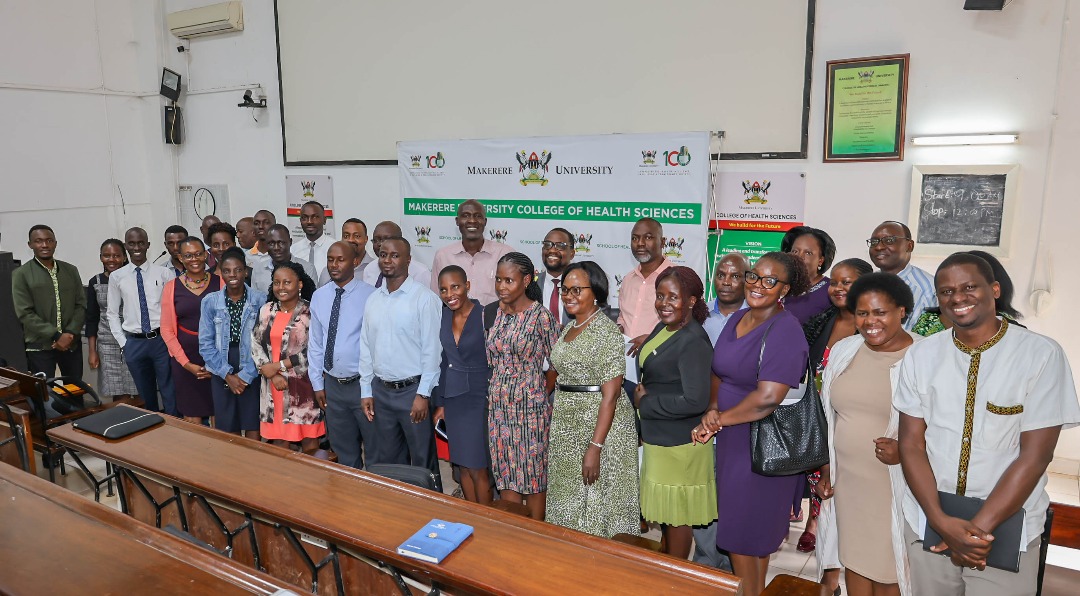
By: Moses Lutaaya
The Directorate of Graduate Training is rolling out the Research Management Information systems (RIMS) to efficiently and effectively monitor the academic progress of all graduate students.
“RIMS will be used to track efficiently every stage of activity of graduate studies from course works, research concept to thesis completion.” The Director of Graduate Training, Prof. Julius Kikooma said.
He added, “The RIMS team is here to share developments on the system that are designed to support the agenda of Makerere university. When graduate students enter a given chapter of their research works, their supervisors will automatically receive mail prompts to swiftly handle, give comments and guide the students on the way forward.”
During the roll out training recently at the College of Health Sciences in Mulago, Prof. Kikooma said, “The Directorate of Graduate Training is working in collaboration with Directorate of Innovation, Research and Partnerships (DIRP) and the Directorate of Information Communication and Technology Support (DICTS) to ensure a smooth training to all the schools and colleges. Digitalising the graduate management process is anticipated to increase the number of graduate admissions and completion in the long run.”
“As the three directorates, we sat and reviewed the university graduate strategy and policies around it. We got reviewed policies and procedures approved by the University Senate last year. We no longer have provisional admission letter requirement for our PhD students. It is now full admission straight away and we follow a cohort system of admission for the PhD by research students.” He added.
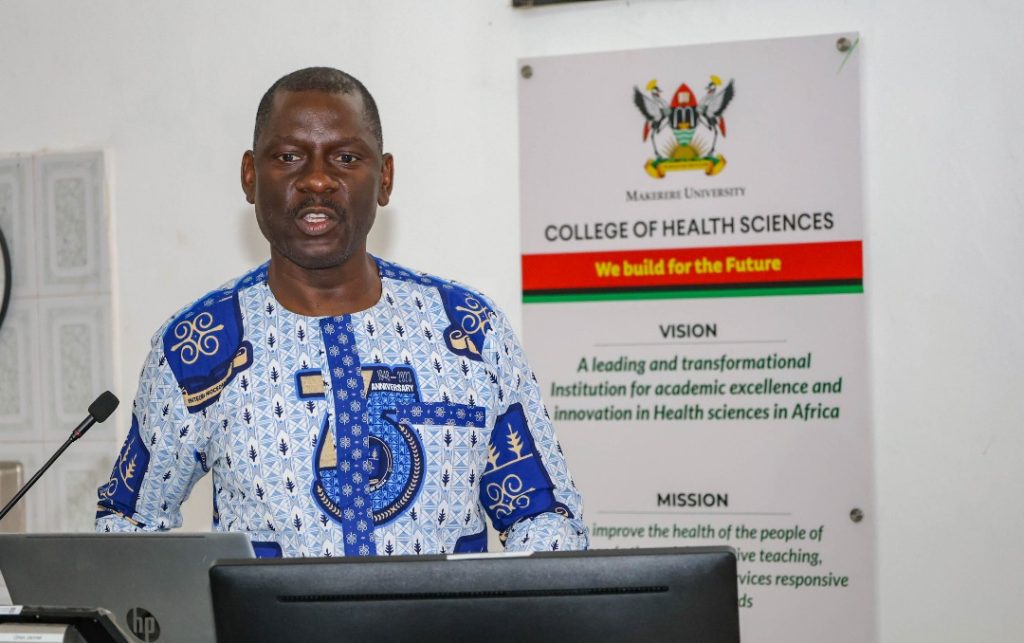
RIMS is a version of how the Directorate of Graduate Training aims to handle the process of systematic tracking of every point of progress in the entire academic journey of graduate students.
The Directorate of Graduate Training has so far conducted the RIMS training at three Colleges namely; College of Health Sciences (CHS), College of Business and Management Sciences (COBAMS) and College of Natural Sciences (CONAS).
The critical stakeholders on the RIMS value chain include Heads of Departments, College Principals and Deputy Principals, Directors, School Deans, Supervisors as well as Graduate coordinators. “All the above are key actors and must be able to use RIMS in the graduate process, capturing all profiles of students and supervisors and should be able to use it appropriately.” He emphasized.
He said that RIMS will bring all stakeholders on the same page and will be able to adequately troubleshoot any hinderance to progress when course works are done, to dissertation and thesis completion. Makerere university target is to increase its graduate students’ enrollment from 19% to at least 30% in the next five years.
Prof. Bruce James Kirenga, Principal College of Health Sciences welcomed RIMS training saying that this kind of E- learning and supervision tracking is the way to handle graduate studies as it seems to reduce the turn around time for student- supervisor responses.
“Every activity in the graduate students learning journey is monitored swiftly. Whatever the students upload on to the system, supervisors get message pop-ups on their mails, review the works immediately and attach comments for the students to appreciate and manage appropriately.” He said.
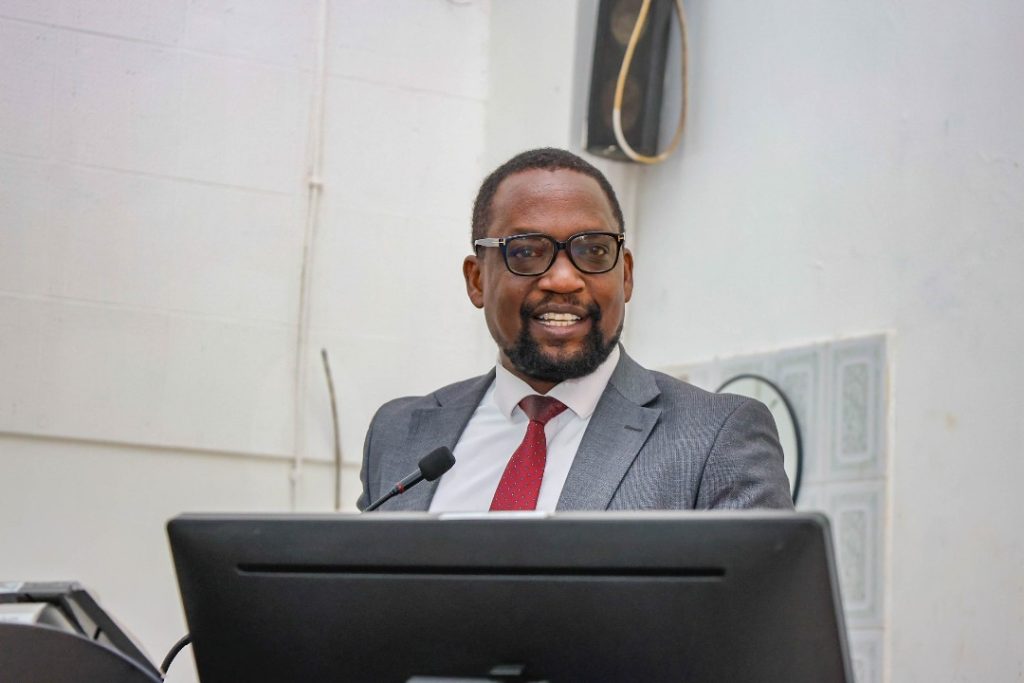
Prof. Kirenga added that the audit trail created under RIMS will provide good progressive academic reports and improve the journey to Doctoral studies.
“Heads of Departments are able to see all students in the department, any pending system approvals, observe completion rates and total progressive over view of each student and that the total overview of department performance will be clearly seen under RIMS.” He added.
Dr. Robert Kalyesubula – the Chair. Dept of Physiology, Makerere University College of Health Sciences said RIMS will improve the efficiency of supervisors while handling the graduate students.
“RIMS views all documents and proposals of students. We will be able to observe which supervisor takes long to respond, the number of days they have taken to respond and how long an issue has pended undone at a certain level.”
Research
Mak and MSU Host Landmark Symposium on Insects for Food, Feed, and Food Security in Africa
Published
3 weeks agoon
June 10, 2025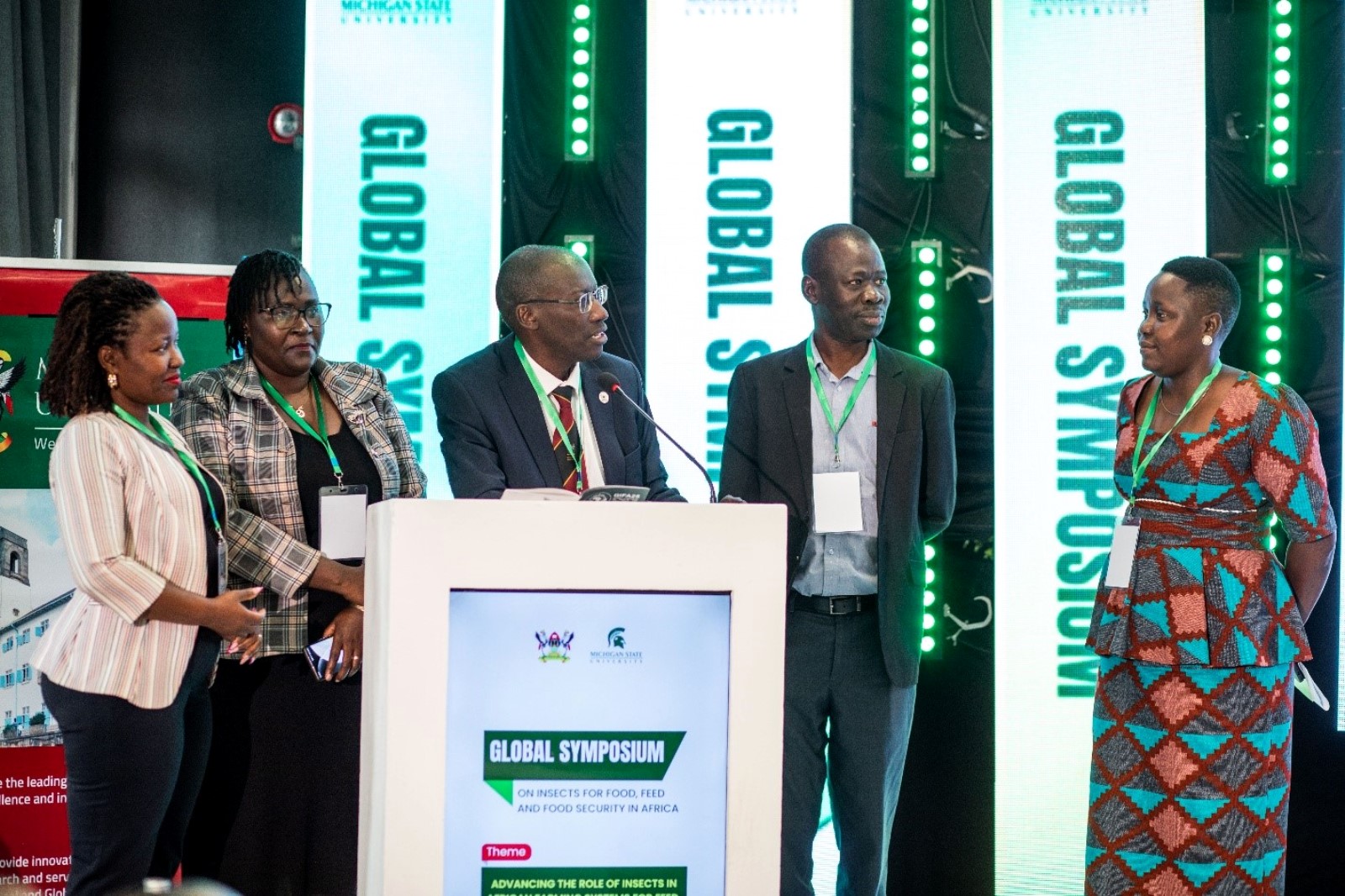
A groundbreaking symposium exploring the role of insects in African farming systems concluded on June 6th, 2025, at Onomo Hotel in Kampala. Convened by Makerere University’s College of Veterinary Medicine, Animal Resources and Biosecurity (CoVAB) in collaboration with Michigan State University (MSU), the event drew participants from over ten countries, including researchers, development experts, regulators, and practitioners.
Under the theme “Advancing the Role of Insects in African Farming Systems for Feed, Food, and Food Security,” the two-day gathering aimed to share knowledge and experiences on integrating insects into food and feed systems to address food security challenges across the continent. The discussions revolved around four key sub-themes namely; Insects as animal feed to promote sustainable livestock production and livelihoods; Insects for human food and food security, including indigenous insect-based diets; Insects for improved soil health and crop production and Commercialization of insect farming, with a focus on regulation and standardization.
The symposium commenced with opening remarks delivered on behalf of Makerere University’s Vice Chancellor, Prof. Barnabas Nawangwe, by his representative, Prof. Frank Norbert Mwiine, Principal of CoVAB. He welcomed participants and commended Dr. Deborah Amulen, Lecturer at CoVAB and chief convener, for organizing a well thought out event. He emphasized that the symposium would not only raise awareness of the role of insects in Uganda’s and Africa’s socio-economic development but also help place insects on the agenda for broader discussions and integration into food security strategies. He said the event served as a platform for knowledge exchange, highlighting the untapped potential of insect farming in transforming food security, sustainable agriculture, and economic growth.

Key facilitators at the symposium were esteemed experts from leading institutions worldwide, who shared their insights on insect-based food systems and sustainable agriculture. Among the distinguished speakers were Prof. Jeffrey K. Tomberlin from Texas A&M University, Prof. Eric M. Benbow from Michigan State University, Prof. Florence Dunkel from Montana State University, Dr. Denise Beesigamukama, a Postdoctoral Fellow, ICIPE Kenya and Dr. Deborah Amulen the host from Makerere University. These are exemplified in their contribution towards academic research and leadership, policy and industry impact and more importantly their expertise in insect science.
During the deliberations, the experts emphasized that insects offer a viable, sustainable, and nutrient-rich solution to Africa’s growing food demands. The event underscored ongoing research and commercialization efforts aimed at mainstreaming insect farming into the agricultural sector. As global interest in alternative protein sources continues to rise, the symposium marked a significant step toward harnessing the potential of insects to enhance food security in Africa.
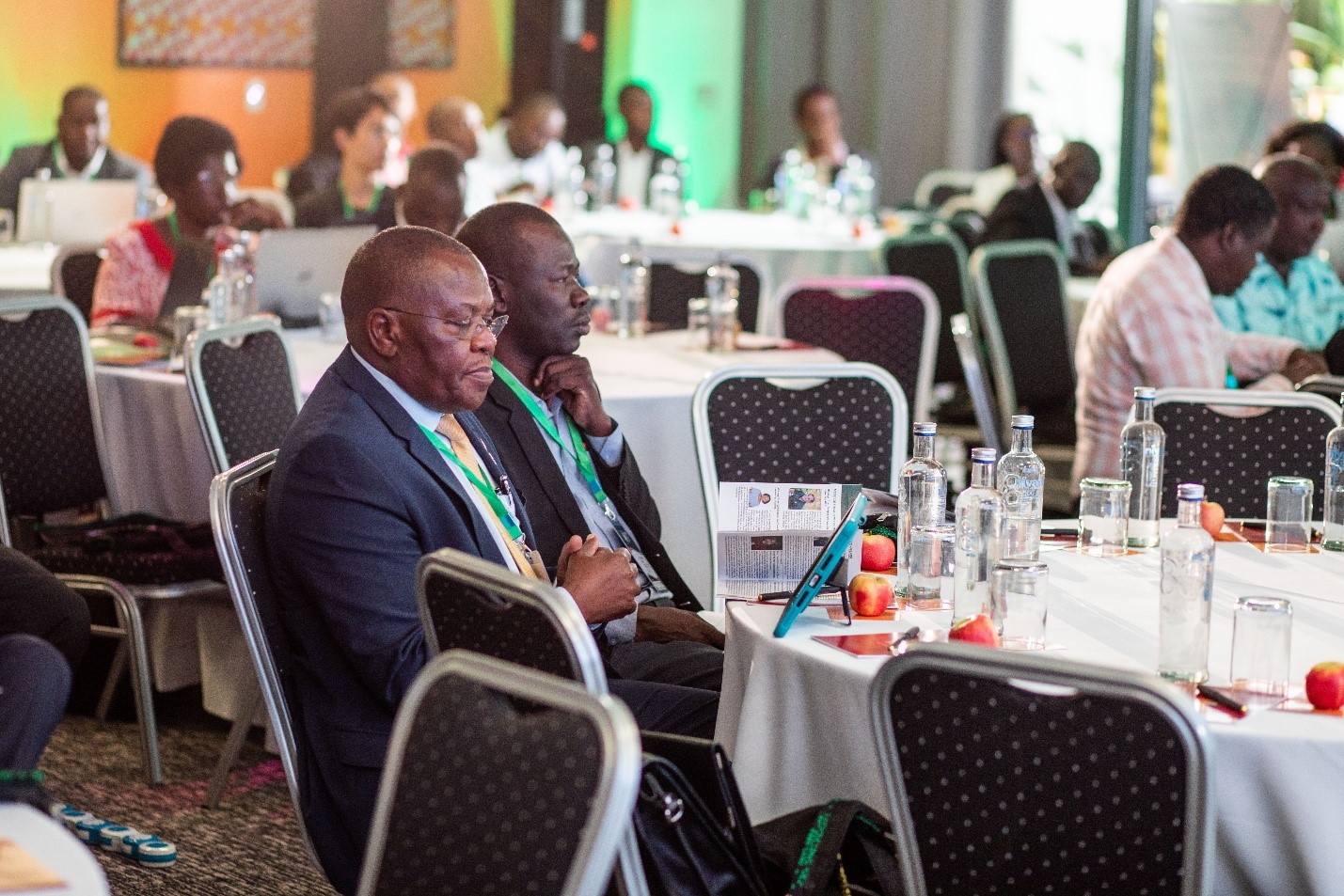
Experts underscored that Africa is home to over 470 recognized edible insect species, providing a rich source of proteins, fats, and essential micronutrients. Insects have historically been a staple in diets across Uganda, Southern Africa, and other regions, serving as a vital food source in times of drought, conflict, and food scarcity. One of the most discussed innovations at the event was the large-scale farming of Black Soldier Fly, which is being utilized to produce not only the larvae but also frass, a high-protein animal feed and organic fertilizer to enhance soil health and boost agricultural yields.
Several scholars presented their research in the area of Insects, where together with the farmers, industry representatives, policy makers and practitioners contributed valuable perspectives on advancing the role of insects in food security, animal feed, and ecological sustainability in Africa. Their discussions underscored the importance of research, policy, and commercialization in expanding insect farming across the continent.
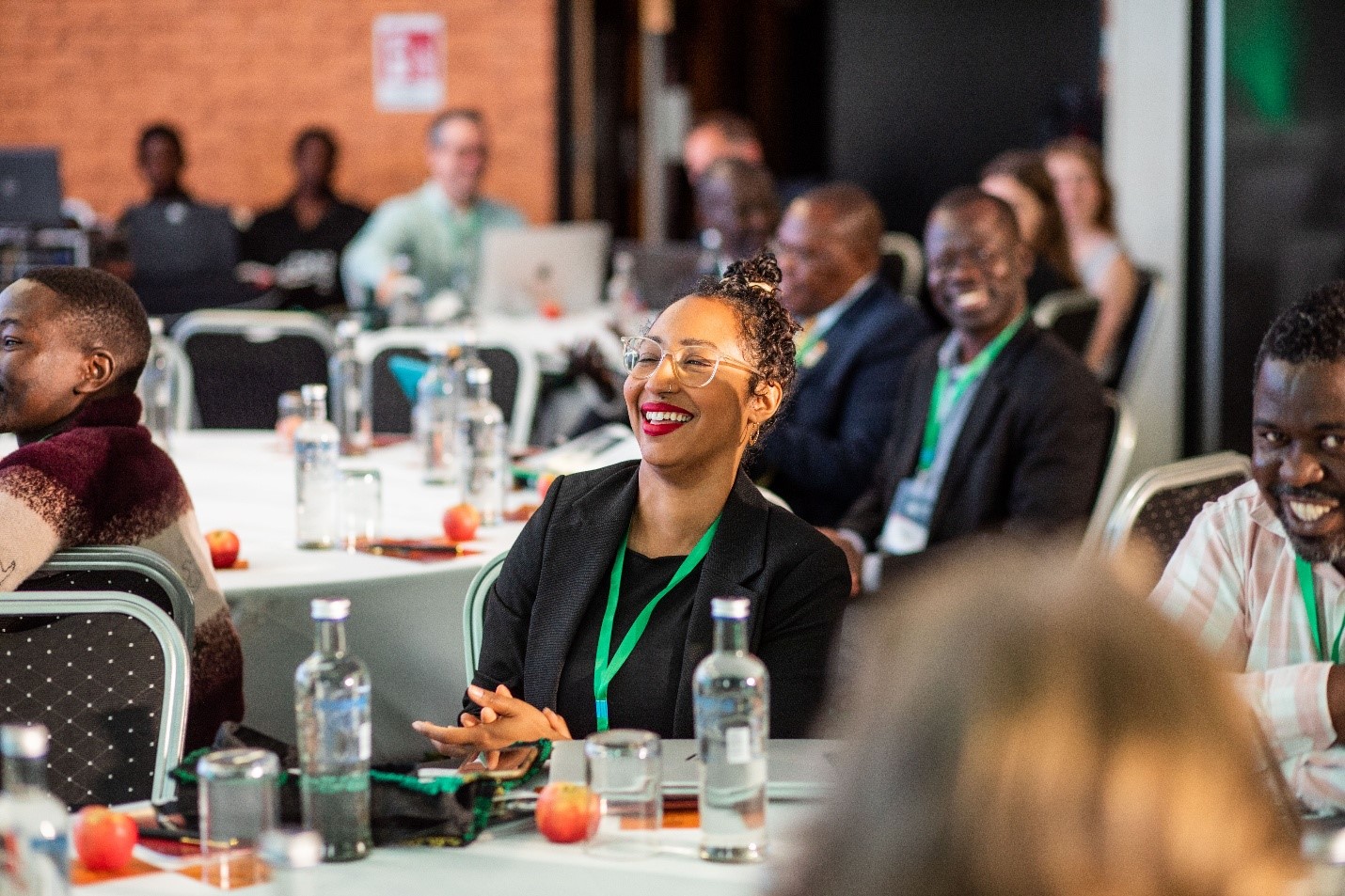
One of the keynote discussions highlighted Uganda’s rich tradition of consuming insects as part of its food culture, reinforcing their significance in nutrition and sustainability. Participants shared insights on local insect consumption practices and their role in livelihoods, drawing from countries like Cameroon, Malawi and many others represented at the event. The forum also featured representatives from key institutions, including the National Council for Science and Technology and The National Agricultural Research Organization (NARO) which contributed perspectives on research, policy development, and commercialization of insects as sustainable food sources, the Ministry for Agriculture, Animal Industry, and Fisheries (MAAIF), emphasizing the Ugandan government’s support for insect farming initiatives.
The Kenya based scientific research institute, the International Centre of Insect Physiology and Ecology (ICIPE) played a key role in the discourse and exhibited several innovations arising from research and their work in insects. Experts explored how insects can revolutionize animal feed production, providing an affordable, high-protein alternative to conventional sources.
With global attention shifting toward alternative and sustainable food sources, experts stressed the need for policy standardization and enhanced investment in insect-based food systems across Africa. During the event, MAAIF announced a $325 million investment through a six-year Smart Agriculture Transformation Project, aimed at expanding sustainable farming practices, reducing environmental impact, and increasing food security through alternative protein sources.
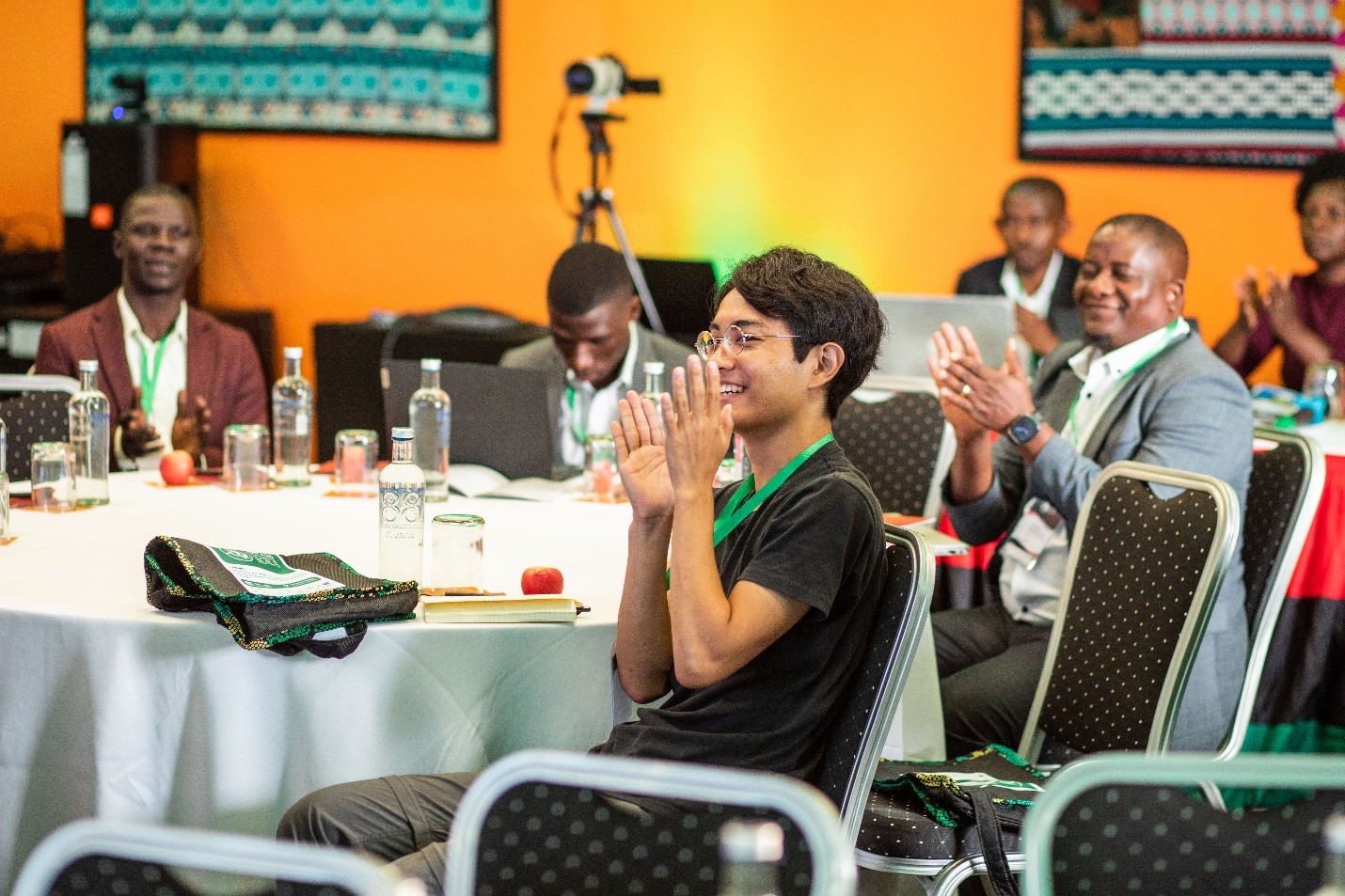
The symposium reaffirmed Africa’s position at the forefront of insect farming research, with discussions centered on scaling production, improving regulation, and leveraging indigenous knowledge for food security solutions. Moving forward, participants emphasized the importance of quality control, standardization, and policy frameworks to ensure safety, scale production, and boost market competitiveness. With Uganda leading discussions on alternative protein sources, the symposium laid the foundation for future innovations in agriculture.
Trending
-

 General4 days ago
General4 days agoMature Age Scheme Exam Results for 2025/2026
-

 General1 week ago
General1 week agoFreshers’ Joining Instructions 2025/2026
-

 General1 week ago
General1 week agoMastercard Foundation Board pays its inaugural visit to Makerere University
-

 General1 week ago
General1 week agoUVCF Makes Case for HEAC Programme
-
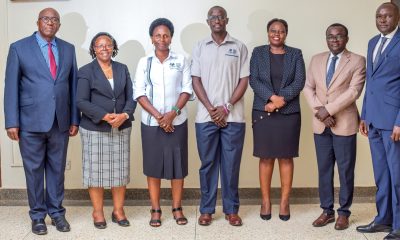
 General2 weeks ago
General2 weeks agoCall For Expression of Interest: MURBS MIS Requirements Gathering
